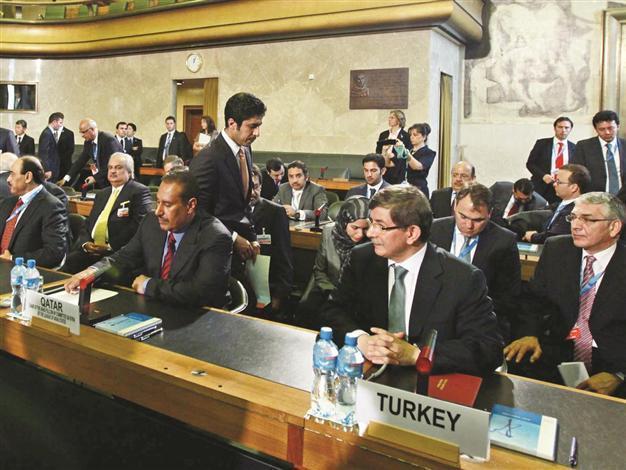Ankara mulls options to ‘dead’ Geneva deal
ANKARA - Hürriyet Daily News

Turkish FM Davutoğlu (R) attends a meeting in Geneva about Syria in this file photo. Davutoğlu and Italian FM Guido Terzi speaks to coordinate the future steps on Syria. AA photo
The course of the 16-month long struggle of opponents of the Syrian regime has changed drastically following last week’s heavy blow to the inner circle of the Bashar al-
Assad administration, and
Turkey believes that the Geneva process can now no longer be considered a viable means to prepare
Syria for the post-al-Assad era.
Ankara and Western powers have intensified diplomatic efforts to achieve an orderly regime change, in a bid to protect the already tense region from becoming further destabilized.
“After the Russian and Chinese vetoes, the Geneva process has lost its meaning. We do not believe the Syrian National Council [SNC] would agree on a transition government that includes Bashar al-Assad or anyone from his team. There is now a need for a fresh formula, which of course will exclude al-Assad,” Turkish diplomatic sources told the Hürriyet Daily News yesterday.
Russia and China nixed the Geneva process that brought the five permanent members of the U.N. Security Council as well as core countries of the Friends of the Syrian People group together following their third veto on Syria in the last 16 months.
This is particularly important because the deal in Geneva was based on the concept – however vague -- of political transition in Syria, with the idea of forming a transition government with the participation of representatives from both the current establishment and opposition groups.
“We doubt whether the opposition groups would agree to such a formula after these achievements,” Turkish sources told the Daily News, citing the military successes of the Free Syrian Army (FSA) in the last week.
The Friends of the Syrian People group is therefore set to return to its pivotal place. The group is composed of 14 countries that agreed on June 7 on an effective transitional period, which does not include al-Assad and his administration. Foreign Minister Ahmet Davutoğlu and his Italian counterpart Guido Terzi spoke on the telephone late on July 21 to coordinate the core group’s future steps in the wake of recent developments in Syria. The next meeting of the Friends of the Syrian People is expected to be held in Morocco next month.
“What will come out of these processes we don’t yet know, but what we do know is that there will be no foreign military intervention,” sources said.
While on the one hand the Friends of the Syrian People will continue to impose political pressure on Syria, more technical and logistical support will continue to be delivered to the Free Syrian Army in a move to weaken the al-Assad administration. For many diplomats, the recent successes of the FSA result from the supply of more weapons and intelligence to the rebels.
Weeks if not days Toppling al-Assad will take weeks if not days, after the FSA’s recent military achievements, according to Turkish diplomats. Control of Syria’s borders with Iraq and Turkey is almost entirely in the hands of the FSA, and the rebels have also gained advantageous positions in Damascus and Aleppo, the country’s two largest cities.
One concern for Turkey is the increased visibility of the Democratic Union Party (PYD), the political offshoot of the Kurdistan Workers’ Party (PKK) in Syria, which has seized control of a number of border villages.
“We are closely following developments on the border with regard to the PYD. The reason for the increased visibility stems from the fact that Damascus pushed them to take the control of these villages a while ago,” sources told the Daily News.
The PYD had announced that it was going to move with other Kurdish groups against the al-Assad regime after a meeting in Erbil two weeks ago, and sources said Turkey would closely follow future steps this group makes.
No position against Israeli movesOne aspect that is developing as the signals of regime change become stronger is the Israeli engagement in the process, with regard to Syria’s strong arsenal of chemical and other kinds of weapons. American media have reported increased dialogue between the U.S. and Israel about potential military moves to prevent the use of these weapons either by the current regime or by fundamentalist groups within the FSA. Turkish diplomatic sources said they were aware of such reports, but they had no position on them.
